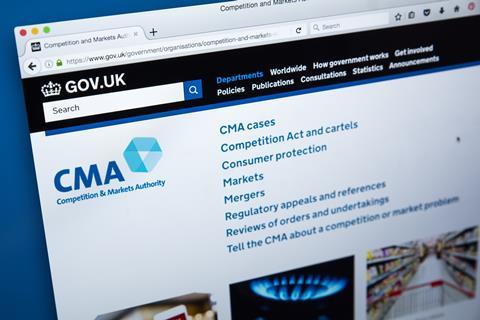But Competition and Markets Authority says firms won't get a 'free pass'
The Competition and Markets Authority has said it will allow firms to work together to support the fight against coronavirus.
The watchdog said businesses assisting in national and local efforts to tackle the consequences of the covid-19 pandemic, included those providing essential goods and services, as well as those ensuring key workers can carry out their tasks.

It said: "The CMA understands that this may involve coordination between competing businesses. It wants to provide reassurance that, provided that any such coordination is undertaken solely to address concerns arising from the current crisis and does not go further or last longer than what is necessary, the CMA will not take action against it.
"The CMA will not tolerate conduct which opportunistically seeks to exploit the crisis. The CMA will take enforcement action to prevent consumer detriment."
It said the current situation may trigger the need for companies to cooperate in order to ensure the supply and fair distribution of scarce products and/or services affected by the crisis.
The CMA said it will not take enforcement action in a number of situations.
It said where temporary measures to coordinate action taken by businesses were appropriate and necessary in order to avoid a shortage, or ensure security, of supply or are clearly in the public interest firms could break usual competition rules.
The CMA also said as long as the firms collaboration contributed to the benefit or wellbeing of consumers, deal with critical issues that arise as a result of the covid-19 pandemic and lasted no longer than is necessary the watchdog would not investigate.
But the organisation did also provide a number of examples of when it would pursue action against firms.
It said: "This does not give a ‘free pass’ to businesses to engage in conduct that could lead to harm to consumers in other ways. The CMA will not tolerate unscrupulous businesses exploiting the crisis as a ‘cover’ for non-essential collusion."
It said it would issue an update when the relaxed rules came to an end.
Examples of when businesses could face enforcement action
(a) businesses exchanging with their competitors commercially sensitive information on future pricing or business strategies, where this is not necessary to meet the needs of the current situation;
(b) retailers excluding smaller rivals from any efforts to cooperate or collaborate in order to achieve security of supply, or denying rivals access to supplies or services;
(c) a business abusing its dominant position in a market (which might be a dominant position conferred by the particular circumstances of this crisis) to raise prices significantly above normal competitive levels;
(d) collusion between businesses that seeks to mitigate the commercial consequences of a fall in demand by artificially keeping prices high to the detriment of consumers; or
(e) coordination between businesses that is wider in scope than what is actually needed to address the critical issue in question (for example, if the coordination extends to the distribution or provision of goods or services that are not affected by the covid-19 pandemic).


























No comments yet